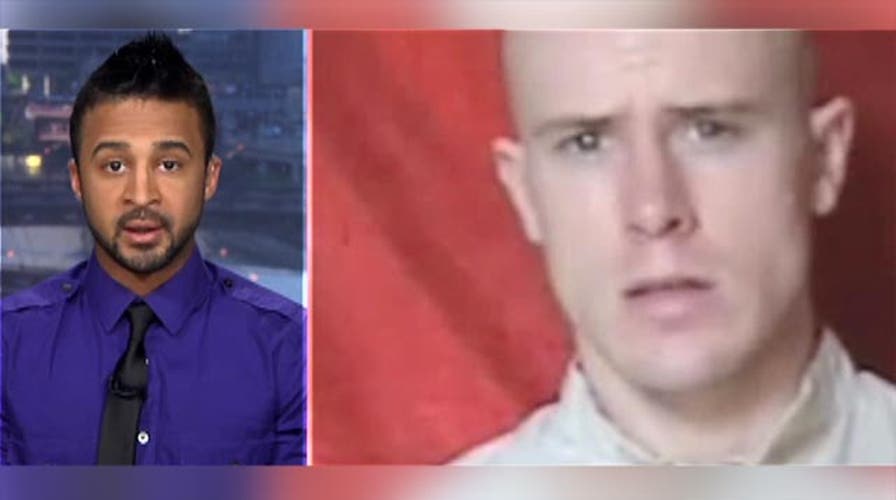Soldier who served with Bergdahl: He got real heroes killed
Only on 'On the Record': Soldier who served with Sgt. Bowe Bergdahl says members of jis platoon were killed trying to find the former POW
This is a rush transcript from "On the Record," June 3, 2014. This copy may not be in its final form and may be updated.
GRETA VAN SUSTEREN, FOX NEWS HOST: Our next guest served with Sergeant Bergdahl in Afghanistan. Retired Army Private First Class Jose Baggett says that Sergeant Bergdahl is no hero. One of Bergdahl's most significant contributions to the mission was to get real heroes killed. Private First Class Baggett joins us.
Good evening, sir.
PFC. JOSE BAGGETT, U.S. ARMY, RETIRED: Hi, how are you?
VAN SUSTEREN: Good. Why do you say that that is he no hero? What do you know about him?
BAGGETT: I wasn't in his platoon personally, so I don't know him directly. The people in the 2nd Platoon were the ones closest to him. But when he walked off the observation post and they looked for him and they did their checks in the morning they didn't find him, he was gone. He was missing. And he walked off. And so our mission changed. And since our mission changed, people were put at risk and people's lives were lost because we were searching for him.
VAN SUSTEREN: How do you know that?
BAGGETT: Because that's -- I mean, that's what happened. Our mission was no longer to do what we were supposed to do, but it was to find Bowe Bergdahl. A lot of our platoons were spread thin already. Our platoon, or the 3rd Platoon, my platoon was ambushed and we lost Lieutenant Andrews and Matthew Martunic. And Lt. Andrews saved some lives that day as well. And to me, those are heroes, not someone who abandoned their platoon and left in the middle of the night and put everybody in danger for months and months and months to come.
VAN SUSTEREN: If I understand this correctly, that your platoon that got ambushed, the men in your platoon that were ambushed, they were actually out looking for Sergeant Bergdahl?
BAGGETT: Right. That was part of the mission, yes, was to find him. Was to look for him, to search for him. We were always searching for him as soon as he came up missing. Anything we did, it was because we were obviously looking for him. Like I said before, this isn't a political standpoint for me at all. I don't have any political views on anything about it at all. It's just the facts. And the fact is, you know, our mission changed. And it was because Bowe Bergdahl left. He left on his own accord.
VAN SUSTEREN: What were people saying about him when you were in Afghanistan and after he had walked off?
BAGGETT: Only things I had heard was that he wasn't approval -- he didn't approve of how the American -- like the United States Army was going about operations in Afghanistan. And when I had known him and seen him before we deployed, he just seemed like a quiet guy. He never -- I never heard about him getting in trouble or anything. So, obviously it was a shock to me to -- when I found out that he had went missing and he did it deliberately.
VAN SUSTEREN: Do you know if he left -- I mean, there is some discussion about whether he left a note behind. Or did he say anything before he left?
BAGGETT: That, I do not know.
VAN SUSTEREN: In terms of -- what did it do for morale when he left?
BAGGETT: Well, I mean, obviously, we don't want to leave any of our soldiers behind, so I mean that -- we went looking for him. It sucks when we were missing one of our men. And on top of that, you know, it doesn't really start to hit you until, you know, you start losing your friends as well. And, you know, when we lost -- when I lost -- when our platoon and our company and everybody, when we lost both six guys, including Matthew Martunic and Sergeant Andrews, it's really hard. It's -- because, you know, you start -- I started to lose sight of what was really going on. And we stayed true to the mission and we kept doing what we were supposed to do as soldiers. And we kept looking for him, but when you lose somebody, it's like losing a brother, and you have to deal with that for the rest of your life. And it's hard.
VAN SUSTEREN: Private, thank you, sir. Thank you, sir.
BAGGETT: No problem.

